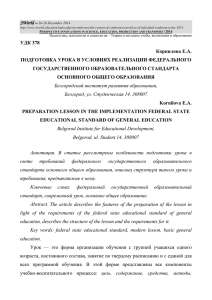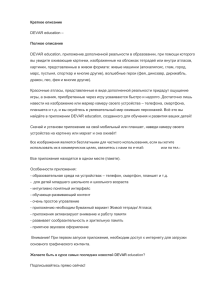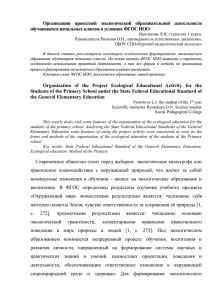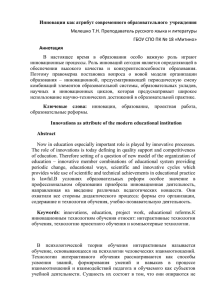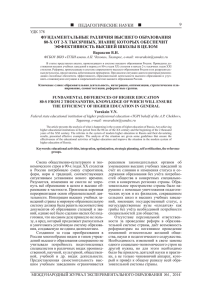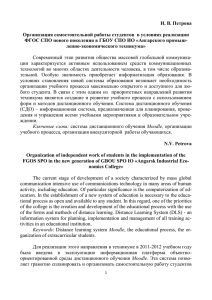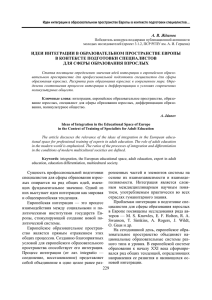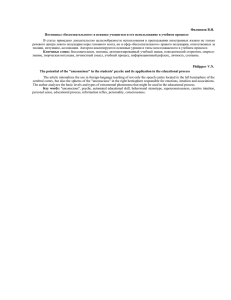Ideal of Education among the European Nobilities
реклама
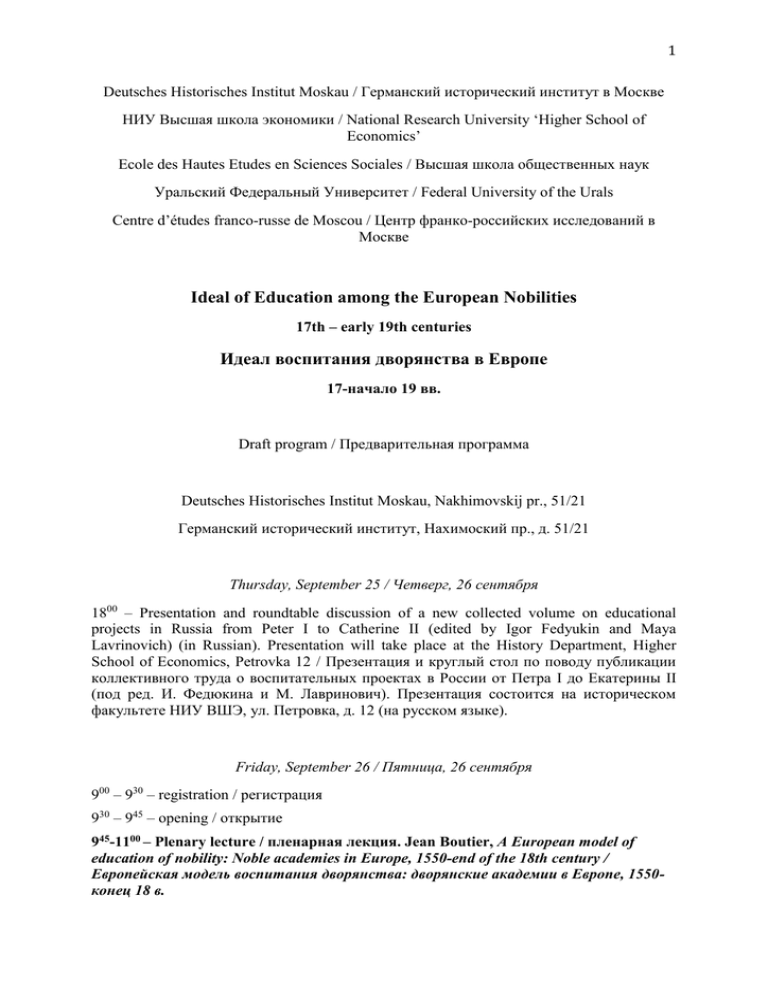
1 Deutsches Historisches Institut Moskau / Германский исторический институт в Москве НИУ Высшая школа экономики / National Research University ‘Higher School of Economics’ Ecole des Hautes Etudes en Sciences Sociales / Высшая школа общественных наук Уральский Федеральный Университет / Federal University of the Urals Centre d’études franco-russe de Moscou / Центр франко-российских исследований в Москве Ideal of Education among the European Nobilities 17th – early 19th centuries Идеал воспитания дворянства в Европе 17-начало 19 вв. Draft program / Предварительная программа Deutsches Historisches Institut Moskau, Nakhimovskij pr., 51/21 Германский исторический институт, Нахимоский пр., д. 51/21 Thursday, September 25 / Четверг, 26 сентября 1800 – Presentation and roundtable discussion of a new collected volume on educational projects in Russia from Peter I to Catherine II (edited by Igor Fedyukin and Maya Lavrinovich) (in Russian). Presentation will take place at the History Department, Higher School of Economics, Petrovka 12 / Презентация и круглый стол по поводу публикации коллективного труда о воспитательных проектах в России от Петра I до Екатерины II (под ред. И. Федюкина и М. Лавринович). Презентация состоится на историческом факультете НИУ ВШЭ, ул. Петровка, д. 12 (на русском языке). Friday, September 26 / Пятница, 26 сентября 900 – 930 – registration / регистрация 930 – 945 – opening / открытие 945-1100 – Plenary lecture / пленарная лекция. Jean Boutier, A European model of education of nobility: Noble academies in Europe, 1550-end of the 18th century / Европейская модель воспитания дворянства: дворянские академии в Европе, 1550конец 18 в. 2 1100-1115 – coffee break / кофе-пауза 1115 – 1345 – Session I. Educational strategies: What kind of education for what kind of nobility? / Воспитательные стратегии: какое воспитание и для какого дворянства? 1. Prokopiev Andrei, Между конфессиональным и сословным стандартом: образование немецкого дворянства в XVI - XVII вв. / Between confessional and social standards: education of the German nobility in 16th – 17th centuries 2. Bruter Annie, Robe and sword nobles in 17th century France: two conflicting educational ideals? / Дворянство мантии и шпаги во Франции 17 в.: два идеала воспитания? 3. Karady Victor, Changing educational commitment and strategies of noblemen in late feudal Hungary (cc. 1760-1848) / Изменение отношения к воспитанию и дворянские стратегии в позднефеодальной Венгрии (1760-е-1848) 4. Lehr Stefan, ‘Только для образования’. Идеал и практика воспитания на примере Голицыных и Сухотиных (1780-1820) / ‘For education only’. The ideal and the practice of education in the Golitsyn and Sukhotin families (1780-1820) 5. Posohova Liudmila, Нобилитация казацкой старшины Гетманщины и Слобожанщины и эволюция моделей воспитания в ее среде в XVIII в. / Ennoblement of the Hetmanate and Slobozhanshchina elite and the evolution of educational models in this milieu in the 18th century 6. Fiorelli Vittoria, Neapolitan ladies: from aristocracy to liberal upper class / Неаполитанские женщины: от аристократии к либеральному высшему классу 7. Voisin Amélie, Educate a duke and bring up an emperor: the complex and very eclectic education of Francis Stephan of Lorraine / Вырастить герцога и воспитать императора: сложное и очень эклектичное воспитание Франца Стефана Лотарингского 1345-1430 – lunch / обед 1430 - 1600 – Session II. Models, transfers, critics, and resistance / Модели, трансферы, критика и сопротивление 1. Cerman Ivo, Moral education among the Bohemian aristocracy / Моральное воспитание аристократии в Богемии 2. Green Michael, Huguenot educators for the Dutch nobility (1620-1700) / Воспитатели-гугеноты голландского дворянства (1620-1700) 3. Stroev Alexandre, Женское воспитание: масонский проект? Трактат графа А.А. Головкина «Мои размышления о воспитании прекрасного пола или Набросок плана воспитания моей дочери» (1778) / Women’s education as a free-masons’ project? The treatise by Count Alexandr Golovkin ‘Mes refléxions sur l’éducation du sexe’ (1778) 4. Kislova Ekaterina, Модели образования в церковной и дворянской среде в России 18 века / Educational models among the clergy and the nobility in the 18th century Russia 1600 – 1615 – coffee break / кофе-пауза 1615 – 1730 – Session II. Models, transfers, critics and resistences / Модели, трансферы, критика и сопротивление 5. Kiselev Mikhaïl, Krivoruchko Anastasia, ‘По науке и достоинству’: проблема дворянского образования в правительственной политике и публицистике в Российской империи в 1760-е гг. / ‘According to their learning and their merit’: 3 education of nobles in the official policy and in the press in the Russian Empire in the 1760s 6. Serwanski Maciey, French aspects in the educational pattern of the Polish nobility in the 17th century / Французские аспекты в воспитательной модели польского дворянства в 17 в. 7. Rjéoutski Vladislav, Идеал воспитания дворянина в России: pro et contra / The ideal of a noble’s education in Russia: pro and contra Evening 1930 – conference dinner / ужин участников конференции Saturday, September 27 / Суббота, 27 сентября 930 – 1100 – Session IV. Educational institutions and educational models / Воспитательные учреждения и воспитательные модели 1. Fedyukin Igor, Воспитание дворянства и дисциплинарные инcтитуты: cтановление модерной школы в России, 1660-1760 / The education of the nobility and disciplinary institutes: the making of a modern school in Russia from 1660 to 1760 2. Khavanova Olga, Врожденное благородство и ученое превосходство: венский Терезианум как сословный образовательный идеал второй половины XVIII в. / Innate nobleness and erudite superiority: the Theresianum in Vienna as the educational ideal of the nobility in the second half of the 18th century 3. Sindoni Caterina, Educational models for Sicilian noblemen between 18th and 19th century: the case of ‘Collegio Cutelli’ / Воспитательные модели сицилийских дворян в 18-19 вв.: Колледжио Кутелли 4. Tumanik Ekaterina, Дворянская воспитательная модель начала XIX века на примере семьи Н.Н. Муравьева: от Осташева к Школе колонновожатых / N.N. Muraviev’s family as a model of education of nobility in early 19th century: from Ostashevo to the School of Military Guides 1115-1130 – coffee break / кофе-пауза 1130 – 1345 – Session V. Trends / Тенденции 1. Stogova Anna, Дружба как императив поведения в Англии и Франции второй половины XVII – начала XVIII в. / Friendship as a behavioral imperative in England and France in the second half of the 17th – early 18th century 2. Bruschi Andrea, Studying vernaculars, studying in vernaculars: modern languages in the education of the élites (France, 17th and 18th centuries) / Учить местные языки, учиться на местных языках: живые языки в воспитании элит (Франция, 17-18 вв.) 3. Kocheleva Olga, Воспитание речевой культуры в российском благородном юношестве / Teaching the art of speaking properly among the young Russian noblemen 4. Andrei Andreev, Формирование воспитательной концепции Ф.-С. Лагарпа: европейские идеалы и русская практика / The formation of the educational system of F.-C. Laharpe: European ideals and Russian practice 4 1345-1430 – lunch / обед 1430 - 1600 – Session VI. What do sources tell us? / Что говорят нам источники? 1. Burkardt Albrecht, The origins of the Grand Tour. Travel in the treatises of education of the nobility from the 16th to the early 17th century / Истоки Гран Тура в трактатах о воспитании дворянства с 16 по начало 17 вв. 2. Le Cam Jean-Luc, The education of Lutheran German-speaking nobility viewed through the prism of biographic information in funeral sermons (1550-1750) / Воспитание лютеранского немецкоговорящего дворянства через призму биографий, содержащихся в погребальных проповедях 3. Fafurin Gennadi, Распространение инноваций в сфере воспитания дворянина через призму европейской книжной торговли и репертуар Петербургской книжной лавки в 1760-х гг. (по архивным материалам) / The spread of educational innovations among the nobles viewed through the prism of the European book trade and the catalog of the Academy bookshop in St Petersburg in 1760s (on the basis of unpublished documents) 4. Smagina Galina, ‘В составе совершенного воспитания’: план образования молодой знатной дамы, составленный академиком Я.Я. Штелиным в 1778 г. / ‘As a perfect education’: plan of education for a young aristocratic lady by academician Jacob Staehlin in 1778 1600 – 1615 – coffee break / кофе-пауза 1615 – 1745 – Session VI. What do sources tell us? / Что говорят нам источники? 5. Berelowitch Wladimir, Воспитательные планы в частном воспитании в России во второй половине 18 в. / Educational plans in private education in Russia in the second half of the 18th century 6. Solodiankina Olga, Воспитательные идеалы и практики рода Шереметевых (XVIII - начало XIX в.) / Educational ideals and practices in the Sheremetiev family (18th – early 19th century) 7. Lavrinovitch Maya, ‘… Вы найдете в господах ваших покровителей, а в вверенных вам детях – друзей…’: как готовили «новую породу» гувернанток для дворянских детей в начале XIX века / ‘… You will find in your masters your protectors and in the children entrusted to you - your friends’: how a ‘new breed’ of governesses for noble children was trained at the beginning of the 19th century 8. Redin Dmitri, Как воспитывали Ивана Васильевича (повесть В.А. Соллогуба ‘Тарантас’) и проблемы дворянского воспитания в русской художественной прозе первой половины XIX в. / How Ivan Vasilievich was brought up (short story by V.A. Sollogub ‘Tarantas’) and noble education in the Russian literature of the first half of the 19th century 1745– 1800 – Final remarks and end of the conference / Заключительные ремарки и окончание конференции
